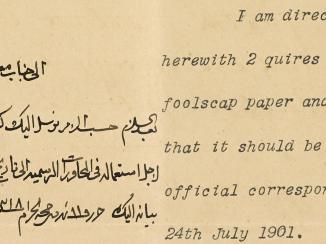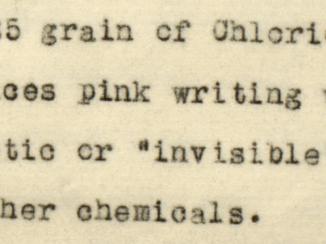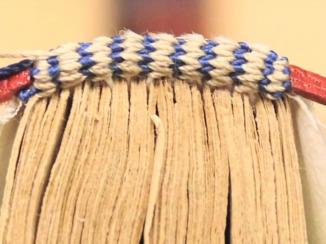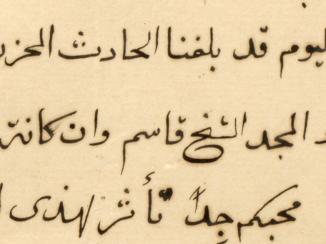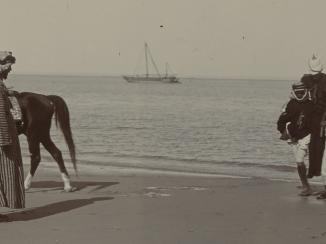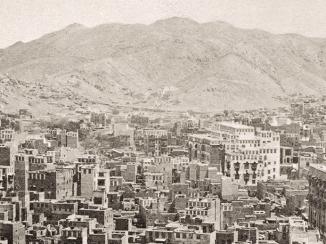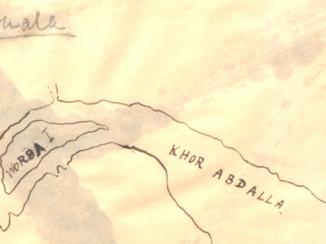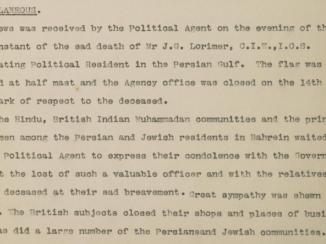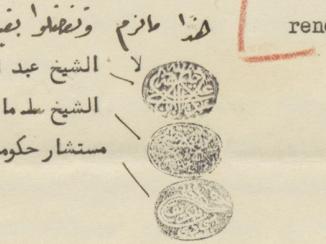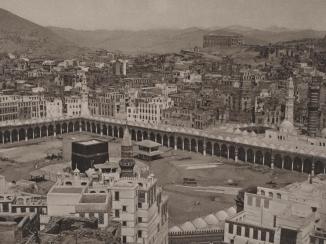Overview
Captain William Henry Irvine Shakespear is an enigmatic figure in the history of Anglo-Saudi relations. Although he was one of the youngest Political Agents to serve in the Gulf, he is more famed for his explorations and photography of the Arabian desert, as well as his close relationship with ‘Abd al-‘Azīz bin ‘Abd al-Raḥmān Āl Sa’ūd (Ibn Sa’ūd). In particular, much legend and romanticism has developed surrounding his life and death at the Battle of Jarrāb.
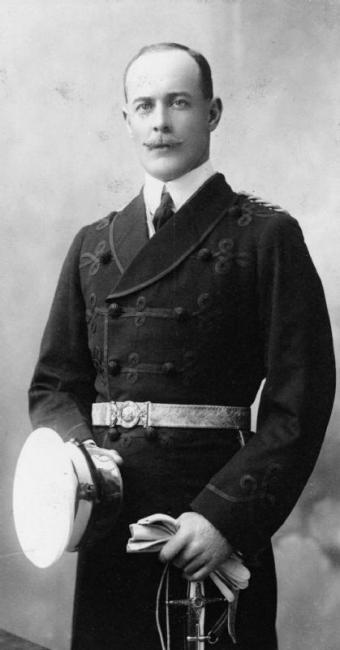
A Treaty of Alliance with Ibn Sa‘ud
On 12 December 1914, Shakespear left Kuwait on a mission to offer Ibn Sa‘ūd a treaty of alliance with the British. He reached Ibn Sa‘ūd’s camp at Khafsah after a nineteen-day journey over three hundred and thirty miles of desert terrain. On 4 January 1915, Shakespear sent a letter to the Political Resident A senior ranking political representative (equivalent to a Consul General) from the diplomatic corps of the Government of India or one of its subordinate provincial governments, in charge of a Political Residency. in the Persian Gulf The historical term used to describe the body of water between the Arabian Peninsula and Iran. at Bushire, Percy Zachariah Cox detailing the political situation in Najd and enclosing a rough translation of the treaty agreement between himself and Ibn Sa‘ūd, confirming that his mission had been a success.
With a strong spirit for adventure and exploration, as well as the need to form bonds with local rulers, gain intelligence and solidify British influence, Shakespear had previously formed a close relationship with Ibn Sa‘ud. As a result, he chose to stay on with Ibn Sa‘ūd, accompanying him on his expedition against the Banī Shammar tribe whose forces were loyal to Ibn Sa‘ud’s enemy, Ibn Rāshid (Sa‘ūd bin Sāliḥ Āl Rashīd).
Khālid bin Bilāl’s Account of the Battle of Jarrāb
On the morning of 24 January, a battle broke out at Jarrāb, close to al-Zilfī, which culminated in the death of Shakespear along with many others on both sides.
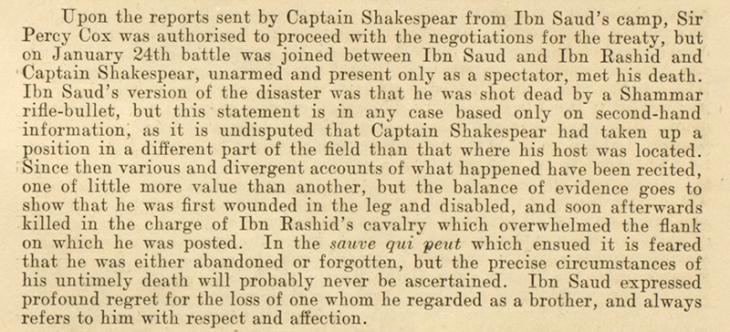
Describing the Battle of Jarrāb in his book about Ibn Sa‘ud, the Lebanese Arab-American writer The lowest of the four classes into which East India Company civil servants were divided. A Writer’s duties originally consisted mostly of copying documents and book-keeping. and intellectual, Amīn al-Riḥānī, claimed that Shakespear ‘rode in the army of Ibn Sa‘ūd’. According to Harry St. John Philby he ‘took part in the battle […] directing the fire of the Wahhabi guns’ and ‘was killed in their charge’.
However, a first-hand eye-witness account by one of Shakespear’s servants, gathered by the British by chance, gives a different view.
On 20 May 1915, Khālid bin Bilāl walked into the British Agency An office of the East India Company and, later, of the British Raj, headed by an agent. at Bahrain to request assistance in returning to his home at al-Zubayr, Iraq. He had been Shakespear’s private cook on his mission to meet Ibn Sa‘ūd and had escaped capture following the Battle of Jarrāb, which he witnessed. His first-person testimony was recorded by Terence Humphrey Keyes, Political Agent A mid-ranking political representative (equivalent to a Consul) from the diplomatic corps of the Government of India or one of its subordinate provincial governments, in charge of a Political Agency. at Bahrain.
According to his account, Ibn Sa‘ūd and his son Turkī requested that Shakespear wait for them at Qaṣīm or al-Zilfī and not proceed to the battle. Shakespear – who he refers to as ‘Sahib’ – refused, saying that it would be ‘dishonourable’ for him to turn back.
The following morning at 6 a.m., Ibn Rashīd’s troops were sighted and within two hours the enemy was rapidly approaching. Ibn Sa‘ūd’s forces ‘dug ditches at a distance of about five-hundred yards behind the fighting’ and ‘all the kit, tent[s] and all sorts of luggage [were] loaded on camels which were made to sit in the ditches’ along with Shakespear’s servants, including Khālid bin Bilāl.
Taking Photographs
Shakespear then proceeded towards the battle on camelback. He dismounted and ‘went on to a mound with his camera and took photographs’. Amīn al-Riḥānī, too, had attested to Shakespear ‘carrying a camera amongst his luggage’. Ibn Sa‘ūd ordered a general attack. ‘The enemy however had superior cavalry and more men’, recounts Khālid bin Bilāl, ‘and soon dispersed [Ibn] Saud’s army, causing a complete rout’.
It was at this point that Khālid bin Bilāl lost sight of Shakespear. ‘As they fled… [t]he enemy plundered everything they could lay hands on. Many men were killed on both sides. Everybody saved his life as best he could’. After two hours the fighting was over and Ibn Rashīd’s forces, the Banī Shammar, took him prisoner.
Finding the Corpse of Shakespear
Khālid bin Bilāl spent two nights in captivity before he managed to slip away. Hiding under a bush, he listened to his captors speaking about the battle and learned of Shakespear’s death. At first Shakespear had ‘received a wound in his right elbow and afterwards was killed by two bullets’ – one in the head and the other in the back.
When Bilāl returned to the battlefield, he recounts that he ‘went round the dead bodies and recognized the corpse of Captain Shakespear. Every thing had been stripped off him’. He continued: ‘I found marks of three bullets on his body – one in his right arm, one at the back of the head and the third in the groin on the right side. I saw him twenty days after his death’.
This account by Khālid bin Bilāl helps to shed further light on the event of the Battle of Jarrāb and Captain Shakespear’s involvement in it. In spite of his death at the age of thirty-seven, the mission was successful as Ibn Sa‘ūd signed the Anglo-Saudi Treaty on 26 December 1915 along the lines of Shakespear’s draft.

